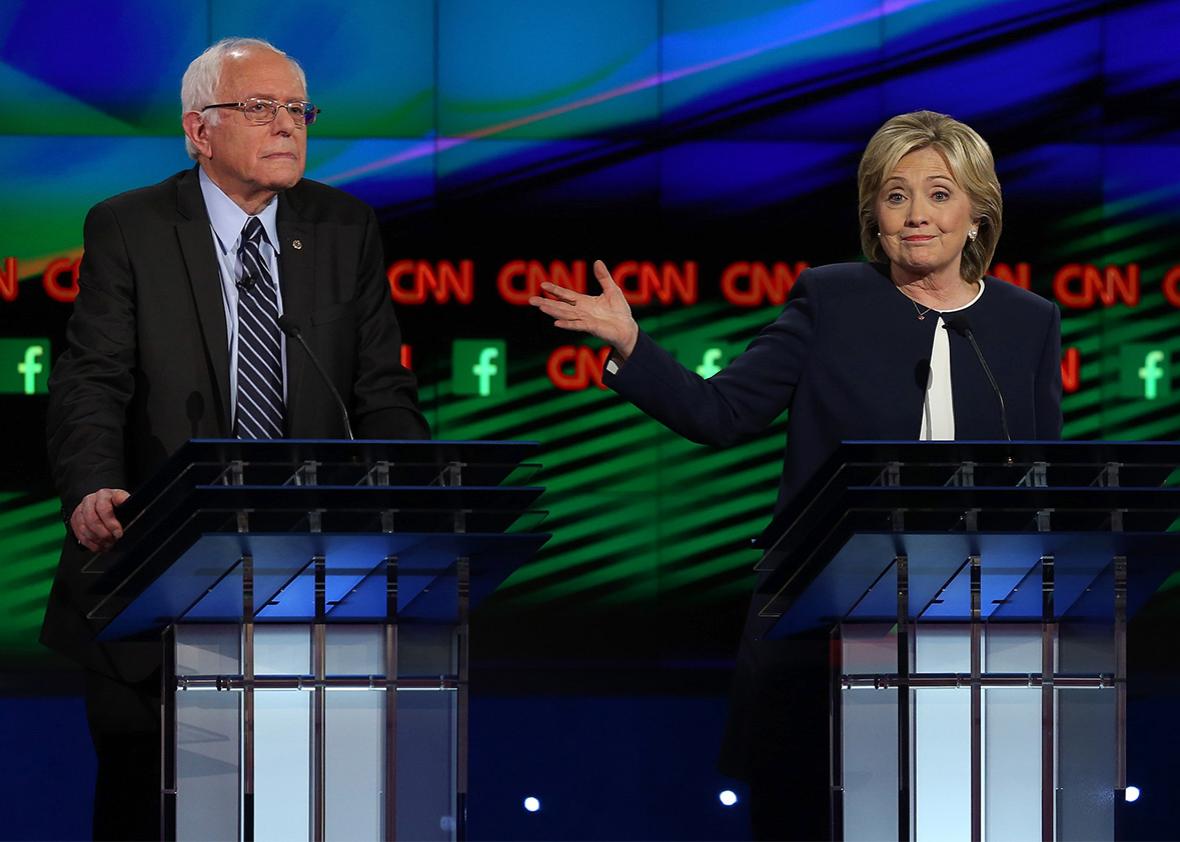On Saturday, Hillary Clinton, Sen. Bernie Sanders, and Martin O’Malley will face off in the third debate of the Democratic presidential season. But first, Sanders has to deal with a scandal.
The Democratic National Committee maintains a master list of likely Democratic voters, which it lends to national and state campaigns. Those campaigns add their own, private data to supplement the central database. That data—a tangible record of campaign work and the lifeblood of day-to-day campaigning—is firewalled. The Clinton campaign can’t access Sanders’ data, and vice versa. But earlier this week, a glitch in the database lowered the firewalls for a brief period—about 30 minutes. If it wanted, a campaign could access a rival’s confidential voter data, a real and unfair advantage, given the time and money that goes into building a voter file.
The glitch was quickly fixed, but not before the Sanders campaign—or at least four of its staff members—searched and viewed lists of potential voters from the Clinton file. The Clinton campaign learned of the breach on Wednesday, and on Thursday, Team Sanders dismissed its national data director, who accessed the information.
To people who don’t follow campaign minutae (read: normal people), this is gobbledygook. Indeed, as scandals go, siphoning data from a rival campaign is dull. But it’s a big deal for political operatives—a basic breach of campaign ethics. Which is why the DNC issued a statement in the wake of breach. “The DNC places a high priority on maintaining the security of our system and protecting the data on it,” said communications director Luis Miranda. “We are working with our campaigns and the vendor to have full clarity on the extent of the breach, ensure that this isolated incident does not happen again.”
This is where the scandal should have ended. Sanders apologized and fired a key staffer, while the DNC and its vendor can work to fix the problem and keep it from happening again.
Instead, the DNC took an additional, unusual step. It blocked Sanders from the voter file, pending evidence the campaign has deleted any accessed data from the Clinton campaign. That doesn’t just keep Sanders from national Democratic data, it blocks him from his proprietary data, just weeks from the Iowa caucuses. It freezes the campaign in place and deals a glancing blow to its organizing efforts.
It’s not just a punishment—it’s a provocation. And the Sanders campaign has responded in kind. In a press conference, it threatened to sue. “By their action, the leadership of the DNC is now actively attempting to undermine our campaign. This is unacceptable,“ said Sanders campaign manager Jeff Weaver. “This is taking our campaign hostage.”
He’s right on both counts. The DNC has taken the Sanders campaign hostage, and it is unacceptable. Moreover, this is part of a pattern.
Sanders entered the race with applause from the DNC and its leadership. “Democrats welcome Vermont Senator Bernie Sanders as the second candidate to officially seek the Democratic Party’s nomination for President in 2016,” read a statement from DNC Chairwoman Rep. Debbie Wasserman Schultz.
But DNC actions speak differently. From the unusual debate schedule—a handful of debates, placed on busy weekends—to Wasserman Schultz’s relationship to Hillary Clinton (which stretches back to the 2008 campaign), there’s a real case to make that that the DNC—ostensibly the party’s referee—is either mismanaging the Democratic primary or outright running interference for the Clinton campaign. And comments like this—“Unfortunately, the Sanders campaign doesn’t have anything other than bluster at the moment that they can put out there”—don’t help.
It’s not clear the DNC will change course. It seems to want a collision with Sanders as much as the Vermont senator seems to want one with the DNC. But there’s one person who should speak up—Hillary Clinton.
If there’s anyone who should value fairness in the Democratic primary process, it’s Clinton. If she wins the nomination—as she’s favored to do—she’ll need to unify the party for its tough fight against the GOP. With its behavior versus Sanders, the DNC is an obstacle to that greater good. It makes Clinton’s lead look illegitimate, or at least, invites too many “what ifs.” What if the debates were held at prime time, when Americans were watching; what if the DNC hadn’t tried to sabotage Sanders’ ground game?
Put simply, the DNC’s behavior is a threat to Democratic unity. If she wants to lead the Democratic Party, Hillary Clinton should say something.
